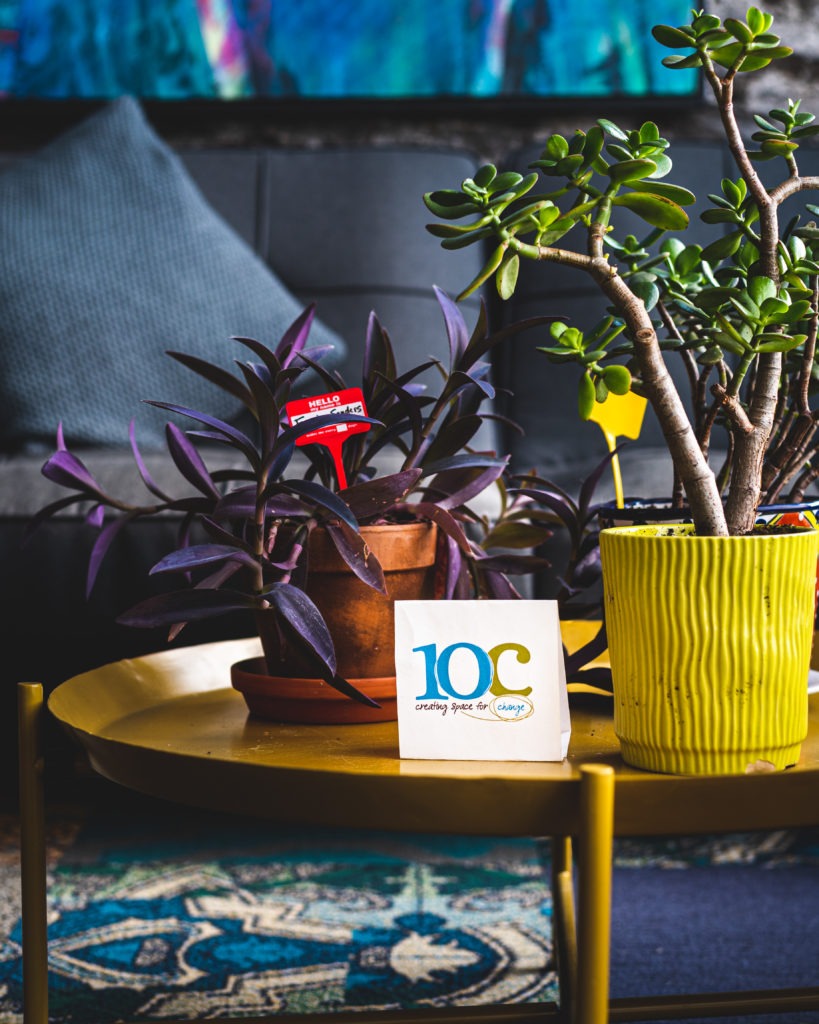Community-focused SDG Research: Using Design Thinking to Amplify 10C’s SDG Impact
A new partnership brought together 10C Shared Space (10C), and graduate students from the Lang School of Business and Economic at the University of Guelph. By connecting with 10C, a hub for change makers located in downtown Guelph, students enrolled in the Creative Process of Innovation Course had a unique opportunity to explore SDG related challenges in the local community.
10C is a hub for social change and innovation in Guelph. In 2016, 10C completed a renovation of the old Acker’s furniture building, a downtown Guelph landmark, successfully activating 15,000 square feet of space as a thriving social innovation hub complete with co-working offices, community event space and a commercial kitchen that would support food entrepreneurs across the region. With over 200 members working across all social change sectors, 10C and its members are well-positioned to play a strong role in building on Guelph’s reputation as a leader in sustainability, innovation and vibrant community engagement.

In 2021, 10C expanded their potential for place-making and SDG impact through management of the Guelph Farmer’s Market. With this new role, 10C now activates over 40,000 sq.ft of social purpose real estate in downtown Guelph.
At 42 Carden and the Market, 10C activates space in different ways, with a focus on community benefit and social innovation. This student partnership would focus on developing new models and ideas for increasing the density of uses within these spaces with the goal of advancing the SDGs, in particular SDG 11.
Design thinking and SDG Innovation
Design thinking is a non-linear, iterative process that is used to challenge assumptions and redesign problems with the aim of developing innovative solutions. Throughout this course students used the initial stages of design thinking – empathize, define and ideate – to understand the context of 10C, and design creative solutions for more meaningful SDG impact.
During an initial meeting with students in the arboretum at the University of Guelph, students learned about 10C and about the programming and activities related to the SDGs. For Elizabeth as the course instructor, the arboretum served as an intentional backdrop for many of the course sessions. During these meetings students were encouraged to engage in ecosystem thinking – keeping the environment in mind as an important stakeholder in the context of social innovation.
The students also learned about how 10C contributes to a number of the SDGs through community programming, place-making, social finance initiatives and much more. There is no doubt that 10C and the broader social purpose community it collaborates with are working to support the SDGs. However, as 10C continues to grow, both in terms of programming and the activation of community space, there may be new opportunities to deepen SDG impact.
These questions formed the core of the design challenge posed to students “How can 10C increase contributions to SDG 11: Sustainable Cities and Communities, and related SDGs, through placemaking and activation of community space?”
The arc of design thinking includes inspiration, ideation and implementation. During the inspiration phase students visited 10C, explored the building and spoke to a number of staff members. Together the class explored the existing ways that 10C is contributing to sustainable and resilient cities. Students identified a number of avenues from resource sharing through the Nourish Kitchen and co-working space to initiatives that reduce environmental impact like rooftop water recycling and urban agriculture.
As a part of the inspiration phase, students also connected with 10C staff and some external stakeholders to learn more about the sustainability strengths and challenges from their perspective. Their goal here was to engage in deep listening in order to understand the challenges and opportunities for creative deeper impact. Based on field notes from their 10C visit and transcripts from interviews, the students were able to understand the community and ecosystem context of 10C and would use this as a basis for their next design thinking phase: ideation.
During the ideation phase, students brought their learnings from the inspiration phase as well as their own passion for sustainability issues both locally and globally. Based on the needs of the community stakeholder, 10C and the interest of students two themes areas for social innovation emerged. One, related to social justice and inclusivity and the other related to the environment and the circular economy.
The first group focused on how to increase access and inclusivity when it comes to 10C’s spaces. They proposed changes to the 10C lobby and entry, creating a more inviting space that would encourage curiosity from passers by. They also suggested taking the model of 10C outside of the physical space of 42 Carden St. and the Farmers’ Market to meet communities where they are and explore together how they can be better served by 10C as a community hub for Guelph.
The second group focused on expanding use of the farmers’ market space to contribute positively to the circular food economy in Guelph/Wellington. Proposal included addition of new kitchen infrastructure, community food and gardening workshops and collaborative partnerships that to reduce food and other waste generated at the market. The solution outlined benefits for 10C as the farmers’ market activator in terms of revenue, community wide exposure and potential new partnerships.

After the ideation phase was complete students presented their ideas to a group of 10C staff and stakeholder, many of whom were interviewed in the initial stage. This gave students a chance to hear feedback that would help further refine their ideas making them more feasible and applicable to the context of 10C and the broader community they serve. This brought the design thinking process full circle, resulting in creative solutions that were fully informed by and rooted in the needs of the community stakeholder.
“At the heart of design thinking is this notion of experimentation. We are learning through testing constantly.“
Dr. Elizabeth Kurcuz
Associate Professor, Leadership & Sustainability – University of Guelph
Community-focused Research Inspired by the SDGs
Through this community-focused research project, students were able to live the design thinking process applying the skills and concepts they were learning in the course to a real community case study. They also had the opportunity to connect with an organization in the local community that is actively working to advance the SDGs and community sustainability day to day.
In the context of this course Elizabeth Kurucz describes the SDGs as important design constraints that guide social innovation. With these constraints in mind students developed solutions that responded to the needs of stakeholders and to the SDGs as a global vision for ssuatiability.
“Designers love constraints. We think of them, as individuals, as hindrances to creativity. But without constraints you can’t design products that are feasible, viable and desirable. [The SDGs] broadened students’ perspectives to think about environmental and social constraints and listening to what stakeholders needs were, they were able to generate ideas to stakeholder issues.”
Dr. Elizabeth Kurcuz
Associate Professor, Leadership & Sustainability – University of Guelph
This research partnership emerged from ongoing conversations about how the SDGs can be used locally for more sustainable, inclusive and resilient communities.
The Lang School of Business has many courses and programs that focus on the SDGs and we are grateful for their enthusiastic collaboration in community based research. For students and instructors, the SDGs provide a framework for learning and research.
Watch the interview with Elizabeth Kurucz, Associate Professor of Leadership and Sustainability in the Department of Management, Gordon S. Lang School of Business and instructor of the Creative Process of Innovation Course.
To learn more about SDG Cities Research Partnerships click here or contact emily@10carden.ca to find out how you can be involved in local SDG research.
